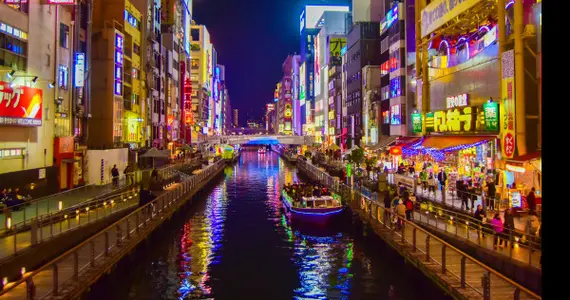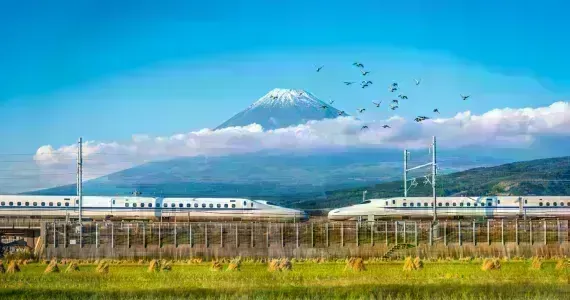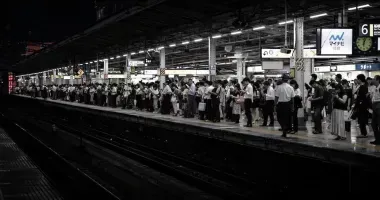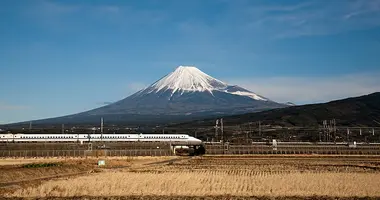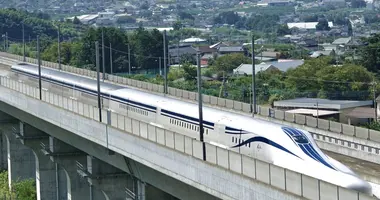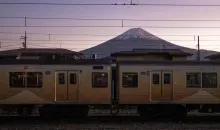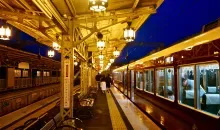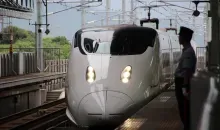Should I buy a Japan Rail Pass or Rent a Car? Finding the best way to get around Japan!
Traveling Japan often entails railway travel, and with that, the Japan Rail Pass is a very popular options. But in some cases, the JR Pass may not be the best option and a car rental may best suit travelers' needs. Take a look at this handy guide to see which is best for you!
While travelers to Japan may initially be enthralled by railway travel, the option of renting a car to traverse the country often comes into question, especially for travelers coming from countries where commuting by car is the norm. While railway travel and the Japan Rail Pass offer many benefits that many should consider, so does car rental.
Overall, you should look at the Japan Rail Pass if you:
- Have a wide-ranging itinerary.
- You are visiting major cities.
- You want transit covered in one price.
- You are traveling with a reasonably-sized group for train travel.
You should look into a car rental if:
- Your desinations are confined to a an area reasonable for driving.
- You are visiting harder-to-reach, nature-centric locations.
- You are willing to spend for car rentals and gas.
- You are traveling with a group that is easier to manage with car travel.
In order to assess which of these options is best for you, we suggest thinking about the questions presented in this article, as your answers will dictate the best way for you to travel around Japan.
What’s your itinerary in Japan?
Determining whether using a Japan Rail Pass to travel via the intricate railway system of Japan versus renting a car is largely going to depend on where you plan to travel. Of course, Japan’s railway system is known for its efficiency and trains operated by the Japan Rail Group are available throughout the country, from major cities like Tokyo, Kyoto, Osaka, and Sapporo, to more rural areas and destinations such as Niigata and Shimane. This range of access is something that is often cited as a major strong-suit of the Japan Rail Pass, however, popular destinations such as the major cities mentioned earlier will typically have easier access than the more rural areas.
The trip from Tokyo Station to Shin-Osaka Station is very common by JR Pass holders, and on that same pass, surrounding ventures to other parts of Kansai is a popular option due to the ease of navigation provided by the pass. These destinations all have very up-to-date and efficient rail systems that are easily accessible, and them being more compact Japanese cities makes driving an option that is often foregone even by residents.
However, this is not the case for every destination within Japan. For travelers who are looking to explore more of the deeper-cuts and rural sections the country has to offer, rail travel may not be the most efficient. Even if the central stations in these areas are accessible by the Japan Rail Pass, the surrounding sites may not be, and in this case, a car may prove to be the superior option or many people who live in more rural prefectures like ones in Hokuriku, Tohoku, or Shikoku, car travel is the standard, as the more farm-based and nature-centric settings present a challenge of space between destinations. Also given that these areas are often less populated than those of major cities like the ones mentioned earlier, train and bus departures are less frequent, often limiting your options as compared to having a rental car on hand.
What do you plan to do?
Aside from just your destination, the nature of your activities will also determine which of these transit options is best for you.
For travelers who plan to explore major cities to see the sites and go to restaurants, the commuting costs for these trips will be covered by the Japan Rail Pass. However, say, for travelers who will be doing more nature-centric activities such as hiking or camping that require a lot of gear and supplies, a rental car with more space may be beneficial, as carrying excessive and heavy luggage filled with equipment on the trains isn’t the most convenient.
It should be noted that Japan has a zero-tolerance policy in regards to drinking alcohol and operating vehicles, including cars and bikes. If something like Izakaya hopping or touring sake breweries is something you wish to do, renting a car is advised against, as you will be legally unable to drive the vehicle with any sort of alcohol present in your body.
For general activities that require a lot of commute, the Japan Rail Pass allows for unparalleled flexibility. Constantly having to drive around and find parking can be a troublesome experience, so be sure to account for the nature of your itinerary plans prior to making a decision between a Japan Rail Pass and a rental car.
Take a look at some of the following activities and see how either a JR Pass or a rental car can play into any of them:
Day Tours in Japan
How much are you willing to spend?
The Japan Rail Pass is most often celebrated for its price effectiveness. Though it may appear as a high expense when determining pre-departure budget, for travelers who are moving around different parts of Japan and taking a lot of public transportation, the initial price is quickly eclipsed by the savings made. A Japan Rail Pass for 7 days costs 230 USD, 14 days at 366 USD, and 21 days for 468 USD. Consistent travel via JR railways throughout this timeframe can seriously add up way past the initial costs of even the 21 day Japan Rail Pass that exists at the most expensive option.
With that noted, Japanese car rentals will almost always be a more expensive option, especially when operating within the time frame that Japan Rail Passes cover (being 7 days, 14 days, and 21 days). While it does depend on a number of factors, a car rental in Japan will cost around 8,000 yen to 12,000 yen (60 USD to 90 USD). This is excluding other fees instituted by the rental company, paying for parking, and paying for gas. With those expenses accounted for two days, renting a car will already exceed the costs of a Japan Rail Pass with a validity period of 7 days. Of course, with these additional costs come a share of privileges afforded by a rental car. Schedule flexibility, privacy, and storage options are great advantages with car rentals, but Japan’s rail system often has a very steady stream of arriving and departing trains and buses.
Who are you traveling with?
It goes without saying that more people take up more space. Add large luggage to the mix and the struggles of public transportation can be made more apparent. For larger groups of travelers (5-6 people) travel of this nature on Japan’s rail lines may not be optimal.
Families may fall under this category, especially ones with smaller children who may have issues navigating transport in a foreign country. Children aside, if you or any other members of your party may find trouble using the public transportation accessible through the pass, a privately-rented car provides big benefits.
But for solo travelers, smaller groups, or families who are used to travel and public transport, rest assured that the accommodation provided by the Japan Rail Group is more-than-sufficable. Strollers and such are regularly brought onto the train and escalator and elevator access is available at all JR Stations. Whether these amenities will suffice or not is up to individual travelers to decide.
Also note that not all travelers will qualify for a Japan Rail Pass. The pass is usable only to foreign visitors to Japan on a tourist visa. If you are traveling with a resident of Japan, buying individual tickets to coincide with the travel done on a Japan Rail Pass will become costly very quickly. In this case, splitting the costs of a rental car may be a better option.
What is driving like back home?
Traffic laws are not always consistent across borders, and it should be especially noted that driving in Japan differs greatly from many countries, especially compared to that of the United States, Canada, and a medley of other European nations.
In Japan, driving is done in the left lane with the steering wheel being placed on the right side of the inside of the car. This is opposite to that of a majority of countries where the residents drive in the right lane with the steering wheel being placed on the left side. Also, Japan has its share of unique sign designs in place throughout its roads, and while many of them are intuitive or share universal attributes with signs in other countries, the risk of misunderstanding is still there.
Driving in Japan also requires an understanding of the country’s traffic rules, so depending on the differences, driving may be a difficult endeavor. An example of a differing law is that of the “turn-on-red” rules that exist in countries like the United States. In the U.S., on a majority of roads, a right turn may be done at a red light if clear. The same rule (of course, applied to left turns instead of right ones), does not exist.
At a red light, no cars are permitted to proceed past the light regardless of the traffic conditions. Japan is also a geographically small nation and thus has more narrow roads, especially within its busy major cities.
It is also best to be wary of the potential driving hazards in the countryside as well, as they will often wind around mountains and other natural landmarks. If any of these challenges seem daunting, leaving transportation to the highly-trained public facility drivers through the Japan Rail pass may be your best option.
But for those who are content with these conditions, and /or wish to experience driving in a country like Japan, renting a car can be, not only convenient, but fun and adventurous. It’s important to know that for many travelers who wish to rent a car, they will need a translation of their home country’s license into Japanese. This service is available through Japan Experience and is best done prior to departure.
Benefits of the Japan Rail Pass:
The Japan Rail Pass allows for affordable, unobtrusive travel throughout the country and has its share benefits that can be read here. (Why the Japan Rail pass is a must article)
- Unlimited access to a majority of Japan Rail Group’s facilities throughout the country
- One low price for travel
- Low effort commute through public transport
- No extra expenses such as gas and insurance
- Freedom to travel without responsibility for a rental car.
Order your National Japan Rail Pass now!
Benefits of Renting a Car:
Car rentals may be more suitable for travelers who wish to explore areas not as easily accessible through railway travel or who require more independence. Here are some additional benefits below:
- Full independence and adaptability to one’s leisure
- Ability to traverse the country and enjoy scenery from the privacy of a vehicle
- Extra storage for travelers with excess luggage
- Convenience for large parties/families
- Access to all roads and highways within Japan











